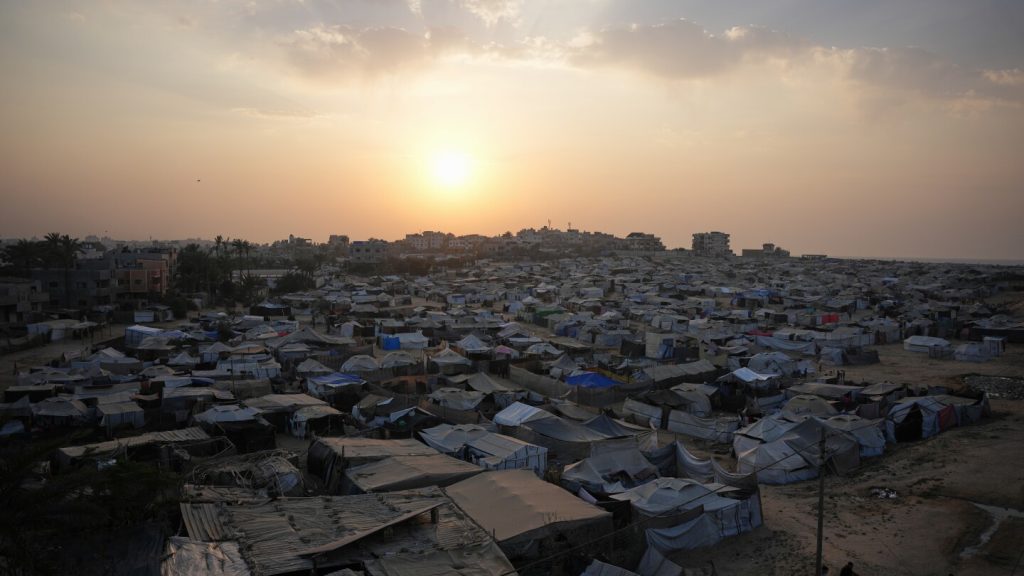Listen to the article
U.S. Proposes UN-Backed International Force for Gaza in Next Phase of Peace Plan
The United States has circulated a draft resolution to the United Nations Security Council that would authorize an international stabilization force in Gaza for at least two years, advancing a critical component of President Donald Trump’s peace initiative to end the two-year Israel-Hamas conflict.
The proposal, confirmed by U.S. officials speaking on condition of anonymity, represents an initial framework for what is expected to be extensive negotiations among the 15-member Security Council and other international stakeholders. The draft is already undergoing revisions based on ongoing discussions.
UN Secretary-General Antonio Guterres emphasized the importance of Security Council backing while speaking to reporters in Doha. “What we believe is that whatever entity that is created in Gaza should have the legitimacy of a mandate from the Security Council,” Guterres stated.
Several Arab nations and other countries that have expressed willingness to contribute troops to the stabilization force have indicated that UN endorsement is a prerequisite for their participation. This international mandate would provide crucial legitimacy for both the stabilization force and participating nations.
The resolution faces potential hurdles from China and Russia, both permanent Security Council members with veto power. Their opposition could complicate U.S. efforts to secure passage of the resolution without significant amendments.
According to the draft, the international force would oversee “the process of demilitarizing the Gaza Strip” and “the permanent decommissioning of weapons from non-state armed groups.” This aspect addresses one of the most contentious elements of Trump’s 20-step peace plan – the disarmament of Hamas, which has not fully accepted this requirement.
The proposal would grant participating countries a broad security mandate in Gaza through the end of 2027. These forces would work alongside a temporary governing authority called the “Board of Peace,” which would administer the territory during the transition period. The draft specifically calls for close consultation and cooperation with Egypt and Israel.
Additionally, the stabilization troops would secure border areas in conjunction with a vetted and trained Palestinian police force. They would also coordinate with other nations to facilitate the “flow of humanitarian assistance” into Gaza.
The draft emphasizes the “full resumption” of aid delivery by the United Nations, Red Cross and Red Crescent, along with measures to ensure supplies are not diverted from their intended recipients – addressing a key concern raised by Israel throughout the conflict.
Hamish Falconer, Britain’s minister for the Middle East and North Africa, recently told the Associated Press that the UK’s immediate focus remains on maintaining the fragile ceasefire and ensuring continued aid deliveries. Falconer noted that “many questions surround phase two of Trump’s plan” and emphasized that implementation of the first phase remains incomplete.
“It’s important for any stabilization force in Gaza to be underpinned by a Security Council mandate,” Falconer added, highlighting the international consensus on the need for UN backing.
The draft resolution represents a significant diplomatic step in addressing the aftermath of a devastating war that has killed thousands and created a humanitarian crisis in Gaza. If approved, it would establish the international framework necessary for rebuilding Gaza’s infrastructure, restoring governance, and potentially creating conditions for lasting peace.
The timing of the resolution comes as regional leaders and international organizations have intensified calls for a comprehensive approach to Gaza’s future that balances security concerns with humanitarian needs and long-term stability objectives.
Fact Checker
Verify the accuracy of this article using The Disinformation Commission analysis and real-time sources.




9 Comments
This proposal seems like a pragmatic step to try and defuse tensions in Gaza. Bringing in an international force could help establish some stability, but a lot will depend on the specifics of the mission and whether all sides cooperate.
You raise a good point. Securing the cooperation of Hamas and Israel will be vital for the force to be effective. Careful diplomatic work will be needed to balance the interests of all stakeholders.
This seems like a reasonable idea in principle, but the politics involved will be extremely complex. Reconciling the interests of Israel, Hamas, and the broader international community will require skillful diplomacy. The two-year timeframe also raises questions about the force’s long-term sustainability.
While a UN-backed force could help improve security and living conditions in Gaza, the proposal raises a lot of questions. How will the force’s composition and rules of engagement be determined? What are the exit criteria? Addressing these details will be crucial for the plan to have any chance of success.
A UN-backed stabilization force could be a positive development, but the devil will be in the details. Determining the force’s mandate, capabilities, and rules of engagement will be critical. Hopefully this can open the door for broader progress on the Israel-Palestine conflict.
A UN-led stabilization force in Gaza could potentially help reduce violence and deliver humanitarian assistance, but its effectiveness will hinge on the cooperation of all sides. Careful negotiations will be needed to ensure the mandate and rules of engagement are acceptable to all stakeholders.
Interesting to see the US push for a UN stabilization force in Gaza. A two-year mandate could help provide security and aid during a critical period, but details on the force’s composition and mandate will be key.
Agreed, the UN endorsement will be crucial to get buy-in from contributing countries. Ensuring the force has the appropriate scope and rules of engagement will be a challenge.
It’s encouraging to see the US proposing concrete steps to try and address the situation in Gaza. A stabilization force could provide much-needed security and humanitarian aid, but significant challenges remain in getting all parties to agree on its parameters.